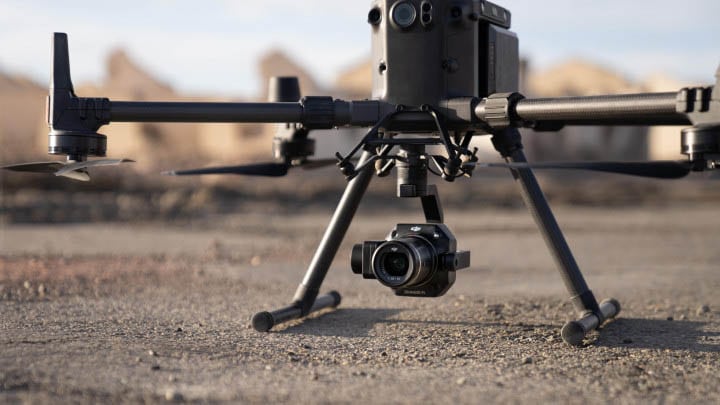
Speed
The first thing you notice when the DJI Zenmuse P1 is at work is speed. The rate at which it clicks pictures is staggeringly fast, a photo every 0.7 seconds to be exact; snap the picture, process the image and store it on the SD card all within a second. We found that the DJI M-300 attached with the Zenmuse P1 was two to three times faster than the Phantom 4 RTK. This speed will be instrumental in covering larger areas, allowing you to cover more ground in a single battery and saving you more time by reducing the number of flights necessary.
Full Frame sensor
The world’s first photogrammetry equipment that sports a full-frame sensor giving the images captured depth like never seen before. Coupled with 45 megapixels, it is essentially a DSLR camera without the weight and size. We can clearly see every crack on the road and even individual solar cells of the lamp post. For our tests, we wanted a real taste of what the P1 was capable of. So we flew our drone at a height of 30 m and 65 m, with the combination of a powerful 45-megapixel camera, the global mechanical shutter and speed, we generated two maps and achieved a GSD of 3 mm and 7.5 mm.
Download the processed orthomap with 3 mm GSD here.
Global Mechanical Shutter
Complementing the speed, the Zenmuse P1 has a global mechanical shutter, with a max shutter speed of 1/2000. Whether you are making 2D Orthomosaics or generating 3D reality captures, the Zenmuse P1’s high shutter speed makes it an excellent asset for accuracy. We found that the global shutter inspires confidence among our pilots, enabling them with the ability to capture from a height while moving fast without the fear of image distortion.
Multiple Lenses
A feature previously only for the Aerial filming application, mappers can now rejoice at the ability to swap around their fixed focus lens. Currently, the supported lenses are 24mm, 35mm and 50mm. This gives us a greater level of flexibility, giving us the ability to be better geared for the specific mission, whether it be mapping agricultural land or construction sites.
Customized Mission Modes
Each of the significant applications of the P1 payload is supported by its own Mission Mode. That is 2D Orthomosaic Mission, 3D Oblique Mission, Detailed Modeling Mission and finally Real-time Mapping Mission. Other than Detailed Modeling Mission, we tried out the other four; it is clear that DJI customized each mission to increase the output of the data captured while increasing the mission’s efficiency.
Smart Oblique Capture
We love efficiency, so when we heard that the Zenmuse P1’s gimbal automatically rotates the payload to take captures from different angles, we were thrilled. Keeping in its theme of speed the M-300 equipped with a P1 could cover our test area in record time effortlessly. Additional care is given to the fields at the edge of the flight area, capturing only essential images. With an 80% front overlap and 60% side overlap, we found that we could bump up efficiency by another 20% thanks to the Smart Oblique system.
Streamlined Data Management
To our delight, when we finished the flight and plugged the SD card into a workstation, we were greeted with data that the P1 automatically sorted into neatly organized files. The data is collected into files by Mission Name and Mission Time and all the GNSS data, Time Stamps, MRK files and images are stored in a central location. This feature gives us a leg up, already making sense of the captured data and presenting in a convenient way for us to process.
The 8th reason to get a DJI Zenmuse P1
You can now pre-order the DJI Zenmuse P1 from us and expect it delivered by the first week of March! Secure your cutting-edge photogrammetry sensor now and reap the benefits. If you’re still not convinced, you can get in touch with us, and we can arrange a demo or even a training session just for you.